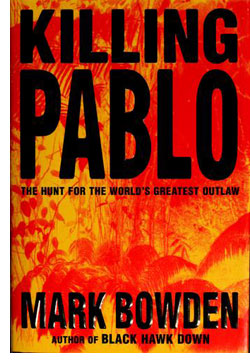 |
 |

Mark Bowden
Killing Pablo
Atlantic Monthly Press
US Hardcover First Edition
ISBN 0-87113-783-6
Publication Date: 04-25-2001
295 Pages; $25.00
Date Reviewed: 07-02-02
Reviewed by: Rick Kleffel © 2002
Index:
Non-Fiction
With the US government going after bad guys as if the world has turned into one giant James Bond/Tom Clancey novel, — and clamping down on information as to how we're doing so — it's something of a surprise that they let 'Killing Pablo' into print. Of course it was there about four and a half months before the destruction of the twin towers. The genie was out of the bottle. It's a pretty exciting genie. As was 'Black Hawk Down', 'Killing Pablo' is a non-fictional look at the US involvement in warlike situation that isn't, strictly speaking, a war. Since that description might well apply to our War Against Terrorism, 'Killing Pablo', the story of the US part in the tracking and killing of Colombian drug lord supreme Pablo Escobar, retains its current events-driven appeal. But even without that appeal it's a gripping read. Bowden sets up the history, then follows events as they unravel across a variety of theaters. I can't claim to have read Tom Clancey, but I suspect that this volume has much of the same appeal as Clancey's work, but Bowden's pictures of the real personalities involved are detailed, compelling and documented.
Bowden starts out a bit dryly as he recounts the history that led to the situation the US had to deal with in the late 1980's and early 1990's. He covers the history of Columbia from 1948 to 1989, and gives a clear picture of how this nation could be sold to bought, and resold to the criminals in charge. Readers may find themselves wondering if they're in for the same kind of thrilling ride that 'Black Hawk Down' provided. It will come, and the setup will help inform what follows. It's worth reading closely, even if it feels like you're wading when you expected a speedboat. When the speedboat comes, if you're not prepared, you'll get mowed over. Even when he's setting the scene, Bowden is confident and often thrilling. The story of Pablo's rise to power is filled with violence and death, most of it orchestrated by Pablo himself. He wasn't particularly good at anything except sheer, utter ruthlessness. At bloody violence, he excelled.
And the speedboat will arrive, have no doubt. Once Bowden has properly set the scene, he's off to show how the US didn't just get involved, it sent military units in-country, though there was not proper war at the time. In other times, it could have been a rather wild accusation, though few would argue with the idea of snuffing out this ruthless (you'll hear that a lot in this book) bastard. Still, the idea that we simply sent in the troops is a bit disturbing. But those troops! Once you see four men with briefcases, totally anonymous, step into the camouflaged spy plane, open up their briefcases to reveal laptop, and plug them into the alcoves that look to conceal nothing more than toilet paper, there's no way any reader will be putting this book down. James Bond is a poof next to these guys.
However, MI6 isn't usually shown to be prone to the kind of in-fighting that Bowden captures. Every US agency involved has an agenda, and few of them are particularly congruent. As the heads and staff of the various units involved duel in administrivia, Bowden keeps track of things on the ground. He also keeps a careful eye on the Colombian side of the equation from the corrupt powers-that-were to the brave but often deceased powers that-that-tried. His revelation of the connection between US forces and the gangsters who opposed Pablo Escobar's monopoly on all things may not turn your hair white, but his in-country travelogues will certainly keep the pages spinning. It's often said that spy thriller fiction is going to be hard pressed to surpass the reality of today's conflict. Bowden's telling the truth of ten years ago, and it's already much more exciting than any fictional version.
|
 |
|
|
 |
| |
Review Archive
All Reviews alphabetized by author.
General Fiction
Non-Genre, general fiction and literature.
Horror
Supernatural fiction, supernatural horror and non-supernatural horror.
Science Fiction
Science fiction, science fantasy, speculative fiction, alternate history.
Fantasy
Fantasy, surrealism and magic realism.
Mystery
Crime, thrillers, mystery, suspense.
Non-Fiction
Non-Fiction, True Crime, Forteana, Reference.
Poetry
|
|
 |
|




